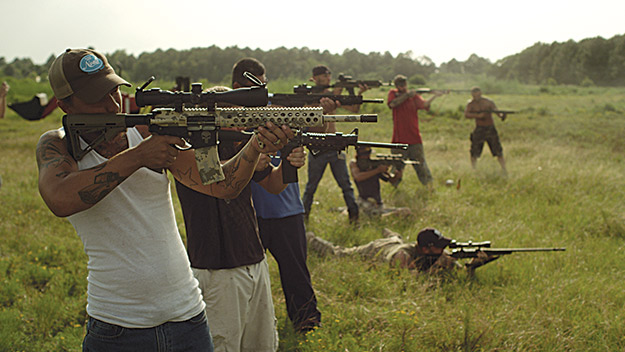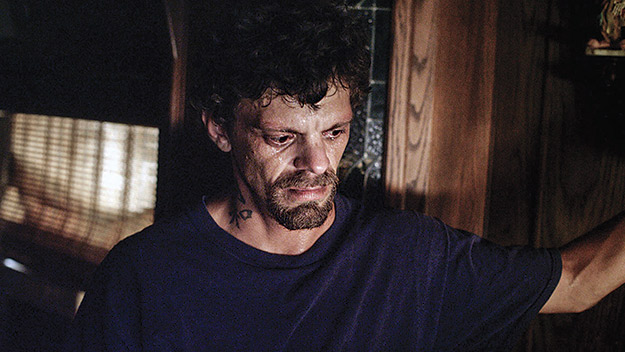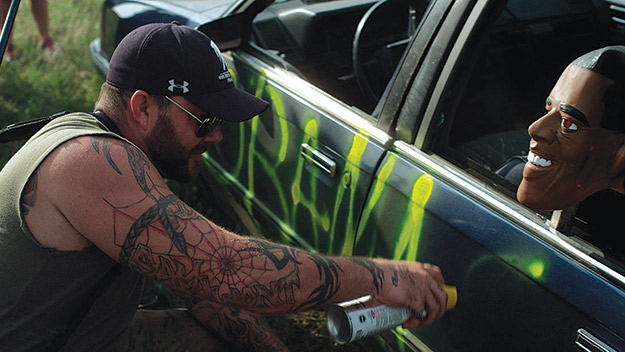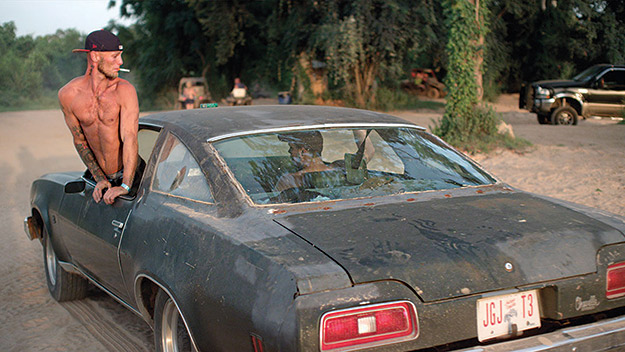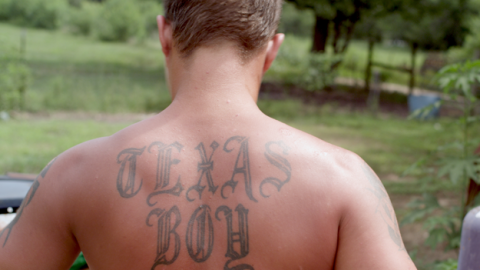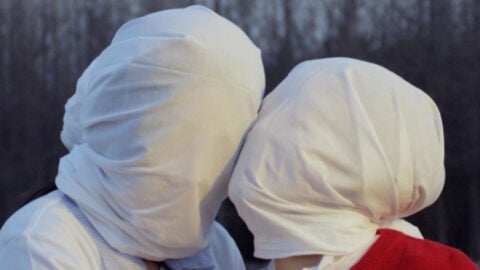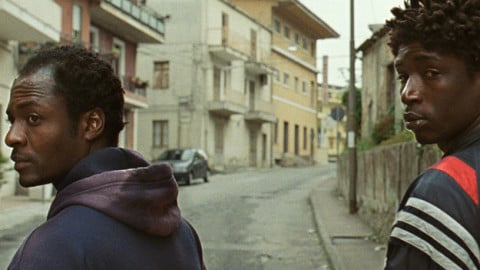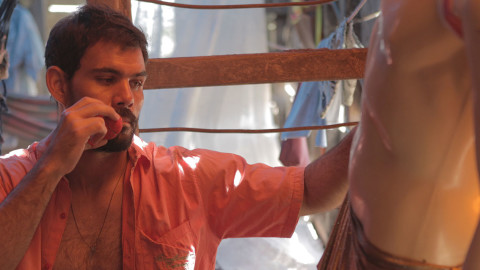Interview: Roberto Minervini
Premiering last year at Cannes in Un Certain Regard, The Other Side continues Roberto Minervini’s docufiction forays into close-knit rural American communities, following his Texas trilogy (The Passage, 11; Low Tide, 12; Stop the Pounding Heart, 13). The Italian-born filmmaker, a Texas resident himself, shows us the life of Mark and Lisa, a loving Louisiana couple scraping by and making free use of drugs. Then, in a rupture toward the final third of the film, Minervini jumps tracks from this intimate portrait to tag along with partying patriots and paranoid militiamen. The switch came as a shock on my first viewing, but by now, the film’s stew of long-simmering sentiments feels prescient about the present Trumped-up moment. Throughout, Minervini gets his subjects to reveal themselves with a disarming directness, through a mix of documentary observation and collaborative dramaturgy.
I interviewed Minervini at Cannes about The Other Side, which opens on May 20, after kicking off this year’s Art of the Real at the Film Society of Lincoln Center. See our May/June issue for Nick Pinkerton’s feature on the filmmaker’s work.
By the end of this film, it’s as if you’re saying that freedom is a kind of religion, at least for the people in the final section of the film. What do you think of that idea?
Yeah, I see the parallelism in the two parts with this pursuit of or hope for freedom. But it is really freedom from fear, which sometimes takes the shape of the primordial fear of being abandoned, of being hidden or invisible. And sometimes the fear takes the shape of an enemy—and the enemy is the government, the institutions. This is in Obama’s term, but it was made clear that the previous enemy was George W. Bush as well. So it was really the institutions. Of course, Obama is intent on taking the country in another direction and gets more heat.
With the older men, we see them hoping that perhaps a woman, or perhaps somebody different, can care about us. A motherly figure perhaps, who can tell us that everything is going to be okay. So it’s something very primordial really, to free themselves from fear.
On that idea, it was interesting hearing all the support for Hillary Clinton, which you might not expect. But thinking about the view of women, the depiction of male and female sexuality in the movie is also interesting. In the crowd scenes, everything feels open and fluid, not just a matter of objectifying. It seemed more complex than just like, the guys have the guns and they rule, you know?
No, absolutely. I had the sense of something really raw and primordial in the South. I lived in New York, and then I moved to the Philippines and then to the South, and I really get something raw, sometimes animalistic. Again, this sense of the bodies as an antidote to the feeling of disappearance. This tactile feeling, being together. The women are very ostentatious. They exude and show off self-confidence. They are powerful, they are not afraid, and that is, of course, significant. Mark is 15 years younger than Lisa, who’s 47. So she’s a motherly figure.
How I work is that there’s no screenplay, nothing written—just this talking and trying to figure out which way we should explore, dig deeper, in this direction versus another. So one day I asked Mark, do you have a man in your life? I know your Dad’s gone, but you have a brother, friends. This male energy is a different way of interacting than it is with women. I see it in Texas, and especially in the South: showing vulnerability to a man is something complicated. As a lesser man, you know? It’s not easy. I’ve never really been like that. But again, I’m from Italy, and that resonates a lot.
So I was asking Mark all that, and he abandoned the project after that question. He said: “Well, let me think about it” and disappeared for a few days. I started following Lisa and her family and her sister. And then Mark came back and said: “You know I didn’t know why you asked me that, why you want that. It just ain’t easy, it ain’t easy.” Because it gets complicated when there’s pain. “I don’t wanna cry, I can’t talk to my bro about my mom dying, I don’t wanna cry.” So the sexuality is part of the nurturing relationship with women.
I’m curious about the performances in this movie, if that’s the right word. It helps so much when people are good performers and comfortable in front of the camera. With Mark, you don’t see the semi-confessional manner that comes up in so much documentary, he doesn’t seem self-conscious.
I am very careful in recognizing screen presence. It’s not like Stop the Pounding Heart—that’s spiritual and at times it’s more made of silences, the main character is extremely imploded, the story implodes. But here it explodes. And Mark had that presence and I recognized it in him the screen presence—the ability to communicate physically and verbally. And without Mark, it would have been another film. And Lisa doesn’t have that. When I lost Mark, I thought with Lisa, this is going to be a different film. She doesn’t have that inner quality.
She doesn’t quite, but she does have a candidness of emotion.
She does. With screen presence, that’s our ability as filmmakers, my team, the post-production team, to craft it—so that this is where the film is “written.” That’s how it’s built: that’s why Lisa’s the screen presence there, that’s why the boy has a different presence, the silent moments with the young boy who wants to be a hero, a soldier. And this is why Mark emerged. And the same for the militia: a charismatic leader emerged. Except for the meeting I never noticed him until later on, and then he really emerged as a person.
And the film draws on the experiences these people have had?
The majority is a fact—literally a fact.
How about that wonderful scene, the marriage proposal?
There are situations like the marriage one, and the one of Mark’s confession of wanting to go to jail to save his life, which work with the same dynamic. Mark confided in me what he had in mind in both cases. We talked about it, and when he was ready, he told me first: “I’m ready.” I was his support system, his confidant—in a way I was a security camera, making sure that everything was on camera in case something happened. So those are two moments where I knew and Mark knew and Lisa didn’t. That proposal is beautiful, it’s spontaneous, and I participated in the backstory by going to buy the ring at Wal-Mart and all that. And the other one, it was a lot of me and Mark in preparation for the moment—we spent a lot of time with him, and he had to tell me he was ready. So that’s how it works: it is still an observation of something but there is some preparation in that.
About how much of the time were you spending with them with a camera versus without a camera?
I would say 20 percent of the time with a camera. With the drugs, there’s not much sleeping going on, so we order breakfast together, and then we talk about what to do and then we hang out a lot, and then we shoot some. We can’t shoot a lot—they dictate the pace and the rhythm. And then at night we sleep, so the cycle continues. For example, in one of the final scenes where a third person shoots her up, and we just see an arm, the guy had just gotten out of jail after 10 years, from Florida, and was paranoid about being filmed in the face. We felt that risk. We went there around 9 p.m., and if you see the last shot, it’s already bright, the sun. I probably shot an hour for the whole night.
And with the confession about going to jail, is that something you shoot just once, or do you do another take?
No. When I do takes, it’s only transitional scenes, in walking. I only shoot one take, and since I shoot digital—this is my second digital film—I shoot the 30 minutes that is available on the card. There is one take, 30 minutes, no cutting, and that’s why we’re three operators, because the camera setup is heavy. We had to pass it along each other’s shoulders without cutting. That is very important for the way I work because keeping quiet for 30 minutes allows them to really get into it, to feel natural, and we become almost invisible. And the more we shoot, the less film jargon is spoken.
Did you have ground rules with the people you were filming, or were you hanging around and sensing when you should be and shouldn’t be there?
There’s no ground rules, even as far as looking at the camera. It’s my work, it’s my job to do all that.
How many people were in your team?
Me, cameraman, sound, and focus.
The camerawork is so skillful.
Thank you, the professionals with me were obviously brilliant at what they do. The main cameraman was an extra lecturer with me in the Philippines. And this time, there are two new imports: a brilliant sound recordist from Mexico, and a masterful extra camera operator from Italy, who also does focus pulling when he doesn’t operate. They’re masters at what they do.
I was reminded a little of another film I just saw here, Mediterranea.
I know the director [Jonas Carpignano]. He’s the son of an ex-professor of mine at the New School, Paolo Carpignano.
Let’s talk about your path to making the films you’ve made. How did you end up focusing on the United States?
America’s the country I live in. I am very passionate about this country. To become a citizen took me so long. It all started after September 11th for me, and it’s been the most complicated time in my life: to be held in a room every time I flew back into America, to be questioned. The only America I know is: I came October 22, 2000, and the Bush-Gore election had been a handful of days after. This is all I know about America.
That’s quite a first year.
Yeah. So I came to America, and that’s how it started. I never stopped being passionate about America. I’m just still trying to understand, and you know, I’ve witnessed everything. The Nevada thing, about claiming land—I was invited there, I know the militia that went there. The Red River in Texas, the same thing happened. In a way, I really wanted to be a photojournalist. I wanted to be on the front line, trying to capture something, taking a risk for my career, for my life perhaps.
What is it that grabs you about these aspects of America? In some respects it seems as if you’re attracted to looking at the things that could destroy the country.
If I made a fiction film about things that destroy the country, I would probably be seen as some sort of misanthrope. But because this is happening before my very eyes, I am convinced this is not just a fringe movement. I personally know that the militia is not small. I went to Louisiana because it’s always in the top five poorest states in the country. That interests me. I used to be, and still am, not so knowledgeable. I came from New York—there’s so much to understand. I was really thinking of going to Ohio and digging deep into a swing state. This is where our future is always determined, and as a small guy with a camera that’s really the least I could do is go there and take a look. I mean, I have two children and I’m raising them in Texas. I’m just a guy trying to really understand and propose something to stir debate, sociopolitical debate.
It’s amazing how the film goes from an hour where it’s basically a portrait of a couple, and then you drop us into something else entirely, with the militiamen. And you close the film with this bold image, almost a statement—the wreck of a car the guys have been destroying.
That was their birthday gift to me. That is shot on my birthday. They said: “We got a surprise for you.” I didn’t have two people on my crew, but they said: “You got to, we prepared something we want to show you.” And that was it. The police came, but when they found out it was just a protest against the government, they said: “Good. Keep you guys occupied. You all keep doing it.”
“Oh, you guys are just burning cars, that’s fine.”
See, that’s the point. I was filming with the amphetamine community, and I was aware there was something political going on. This anger had to go somewhere. For me, the film was that: I knew this reality, and I knew that these two parts could talk to each other. The war veterans are a big issue. Since I’ve been here [in the U.S.] I’ve seen 20-year-old kids that are veterans—not Born on the Fourth of July veterans. They’re angry at the institutions. And I live in the South where war is glamorous. I bring my children to play at a mall where the Marines and the Army recruit on Sunday mornings.
I made the decision that I need this film, unlike Stop the Pounding Heart, to be short-circuited. And if you want to rewire the two parts, the discourse has to step up into something political. There has to be an effort by all of us. If we want to talk about it, for better or worse, we must create the connection between the two parts that talk to each other. It inevitably has to be political.



